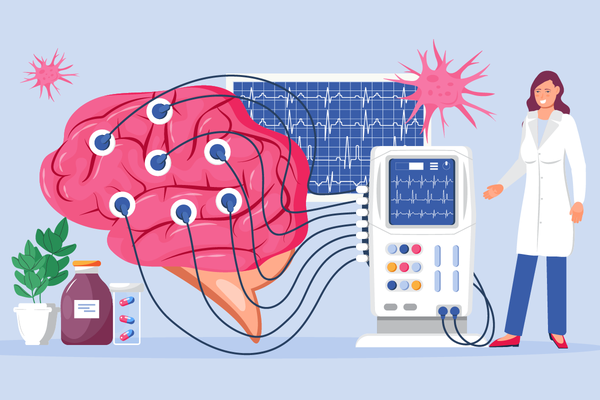Of the nearly 1 million people living with multiple sclerosis (MS) in the United States, 74% are women. Yet, there is still a lack of understanding among women about how MS affects the body.
To learn more, we spoke with Aliza Ben-Zacharia, PhD, an MS consultant, researcher and assistant professor at Hunter College in New York City.
The interview has been edited for clarity and length.
HealthyWomen: What is multiple sclerosis (MS)?
Aliza Ben-Zacharia: MS is a disease where myelin, the protective covering that surrounds most nerve fibers, deteriorates. MS damages or destroys myelin and underlying nerves in the brain, spinal cord and optic nerves.
HealthyWomen: What are the different types of MS?
Aliza Ben-Zacharia: There are four types of MS. Clinically isolated syndrome (CIS) is the first episode of MS. The second type, relapsing-remitting MS (RRMS), involves having at least two episodes separated by 30 days or more. About 85% of patients with MS have RRMS.
The other two types are called secondary progressive MS (SPMS) and primary progressive MS (PPMS). SPMS starts out as RRMS, but then the time between relapses gets shorter, and there is increased progression of symptoms between relapses. Not everyone with RRMS develops SPMS.
With PPMS, patients typically experience a slight progression over many years, and they may have long plateau periods. For example, a person might have trouble with walking so they'll start using a cane, then switch to a walker, and eventually use a wheelchair.
HealthyWomen: What are some of the earliest symptoms of MS?
Aliza Ben-Zacharia: MS affects every system of the body, and no two people have the same experience. One person might have sensory symptoms like numbness and tingling, while another person might have blurred vision. Symptoms may also include weakness or problems with balance and coordination, trouble walking, cognitive impairment or sexual dysfunction.
HealthyWomen: How is MS treated?
Aliza Ben-Zacharia: It really depends on the type of MS and the symptoms. There are many types of MS medications, including intravenous drugs, pills and injectables. Some patients will want to be aggressive with their treatment, while others will want to be more conservative.
HealthyWomen: With so many treatment options for MS available, how do you determine which ones are best for each patient?
Aliza Ben-Zacharia: It's about identifying the type and symptoms and looking at tests like magnetic resonance imaging. It's important to treat MS symptoms because they affect a patient's quality of life. The majority of women I see have RRMS, and many are able to manage it with a disease modifying treatment that addresses their individual symptoms.
HealthyWomen: Are some women more likely to get MS than others? If so, how can these women access care?
Aliza Ben-Zacharia: Some minority populations living in the United States, such as African American women and Latinas, are more likely to get MS than these same populations living outside of the country. These populations are often underrepresented in clinical trials, making the assessment of treatment across all demographics difficult.
To increase access to care for all women with MS, providers can learn how to offer culturally competent care. And patients have a legal right to request a medical interpreter to help them navigate treatment options.
HealthyWomen: Does MS impact reproductive care? What should a woman with MS consider as she plans for pregnancy?
Aliza Ben-Zacharia: Women with MS who want to conceive should talk to their care team. Health care providers weigh the benefits versus risks when considering how we'll modify treatment and symptom management for a woman with MS pre-pregnancy, during pregnancy and beyond. It's important for us to understand a patient's (and, where applicable, their partner's) care plan so we can make any necessary changes.
HealthyWomen: What are some other conditions that women with MS are at risk of developing?
Aliza Ben-Zacharia: Comorbidities (when a person has more than one health condition) really affect how we treat patients with MS. Some of my patients have autoimmune conditions like arthritis, psoriasis and Hashimoto thyroiditis.
The prevalence of depression is very high in people with MS, and I also see many postmenopausal women with osteoporosis. You also have to consider what's causing symptoms. For example, is a patient's fatigue caused by her MS or her anemia? Or if a patient experiences pain, should we assume it's related to MS? It's important to think about these other illnesses when deciding how to treat MS.
HealthyWomen: What about complementary and alternative therapies for people with MS?
Aliza Ben-Zacharia: Complementary and integrative treatments can be very useful. I've recommended acupuncture many times for trigeminal neuralgia, which is a severe facial pain that can occur with MS. Yoga and massage can also support wellness and promote relaxation. Supplements can be helpful, too, but you must check with your MS care team before taking anything.
HealthyWomen: Can lifestyle changes improve MS symptoms?
Aliza Ben-Zacharia: It's so important to be active with MS. Activities like cycling and swimming can help patients feel stronger and more energetic. Physical activity may also help MS patients manage their comorbidities. If a patient with MS has diabetes, for example, exercise can address both conditions.
Mental health is just as important as physical health, so it's critical that patients with MS address their emotional issues. Stress management is also key, since stress can exacerbate MS symptoms.
Healthy lifestyle choices truly are a huge part of MS management. Being socially active, spending time with friends and family (if only virtually), volunteering and continuing to work if you are able can help you remain engaged with the world. This engagement is key to living well with MS.
For more information, visit HealthyWomen's MS hub and the National Multiple Sclerosis Society.
This resource was created with the support of Biogen.
- Fact Facts: Everything You Need to Know About Multiple Sclerosis ... ›
- What drugs are used to treat multiple sclerosis? - HealthyWomen ›
- Multiple Sclerosis - HealthyWomen ›
- How Multiple Sclerosis Affects the Central Nervous System - HealthyWomen ›
- Beyond the Physical: How MS Affects Your Life - HealthyWomen ›
- Multiple Sclerosis Treatment & Shared Decision-Making - HealthyWomen ›
- FAQs About Multiple Sclerosis - HealthyWomen ›
- Preguntas frecuentes sobre la esclerosis múltiple - HealthyWomen ›
- How MS Affects the Body - HealthyWomen ›
- En qué forma afecta el cuerpo la EM - HealthyWomen ›
- Family Planning with Multiple Sclerosis (MS) - HealthyWomen ›







